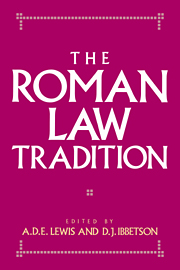Book contents
- Frontmatter
- Contents
- List of contributors
- Foreword: Peter Stein, Regius Professor of Civil Law in the University of Cambridge, 1968–1993
- List of abbreviations
- 1 The Roman law tradition
- 2 Labeo and the fraudulent slave
- 3 Doing and causing to be done
- 4 The danger of definition: contrectatio and appropriation
- 5 Going to the fair – Jacques de Révigny on possession
- 6 Bembo giureconsulto?
- 7 Gentilis and the interpretatio duplex
- 8 Ius gentium in the practice of the Court of Admiralty around 1600
- 9 Stair's title ‘Of Liberty and Servitude’
- 10 The actio communi dividundo in Roman and Scots law
- 11 Sale and transfer of title in Roman and Scots law
- 12 ‘What Marcellus says is against you’: Roman law and Common law
- 13 Audi et alteram partem: a limit to judicial activity
- Index of sources
- Index of names and subjects
9 - Stair's title ‘Of Liberty and Servitude’
Published online by Cambridge University Press: 08 October 2009
- Frontmatter
- Contents
- List of contributors
- Foreword: Peter Stein, Regius Professor of Civil Law in the University of Cambridge, 1968–1993
- List of abbreviations
- 1 The Roman law tradition
- 2 Labeo and the fraudulent slave
- 3 Doing and causing to be done
- 4 The danger of definition: contrectatio and appropriation
- 5 Going to the fair – Jacques de Révigny on possession
- 6 Bembo giureconsulto?
- 7 Gentilis and the interpretatio duplex
- 8 Ius gentium in the practice of the Court of Admiralty around 1600
- 9 Stair's title ‘Of Liberty and Servitude’
- 10 The actio communi dividundo in Roman and Scots law
- 11 Sale and transfer of title in Roman and Scots law
- 12 ‘What Marcellus says is against you’: Roman law and Common law
- 13 Audi et alteram partem: a limit to judicial activity
- Index of sources
- Index of names and subjects
Summary
The problem with the title ‘Of Liberty and Servitude’ in James Dalrymple, first Viscount Stair's The Institutions of the Law of Scotland, is to explain what it is doing there. On the one hand, Stair expressed himself satisfied that the institution of slavery had little relevance in seventeenth-century Europe, and none at all in the Scotland of his day. Adopting the definition in Justinian's Institutes, in turn derived from Florentinus' Institutes, Stair described slavery as a creation of the law of nations, at first arising when prisoners of war ‘did loss their Liberty in lieu of their Life’, later resulting from sale or birth (2.10/1.2.10). Though contrary to nature, slavery was none the less lawful, ‘yet Christian Lenity and Mercy, hath almost taken away Bondage, except amongst the Spaniards, Portugals, and other Christian Nations, bordering upon the Turks’ (2.11/1.2.11). Some southern nations, he explained, still found it necessary to maintain a supply of slaves to exchange for those taken from them.
Otherwise the nearest Christian Europe came to practising slavery was in recognising the status of adscripticii glebae. ‘Such are the English villains’, Stair remarked, ‘but in Scotland there is no such thing.’
- Type
- Chapter
- Information
- The Roman Law Tradition , pp. 135 - 158Publisher: Cambridge University PressPrint publication year: 1994
- 1
- Cited by

